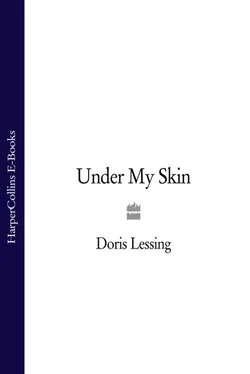There is a question: there has to be. Four years at the Convent, but also four years of holidays, weeks of holidays that seemed when they began as if they would never end. There were a hundred kinds of experiences, good times, picnics, family outings, the dogs, the cats, cuddling babies, or walking all day with my brother in the bush, sitting up at night to watch the stars. But the dark times, the miseries are stronger than the good times. Why is that? ‘Give me a child until it is seven,’ they say the Jesuits say. The talk of war was probably the first thing I ever heard. So perhaps if there had never been the Convent with its bloody and tortured people everywhere, its tortured but smiling saints, it would have been the same. Suppose the Convent had nothing but sunny pictures of woods and fields and kind faces, would then the talk of war have proved stronger? Or is there something inherent in our composition that disposes us to grief and memories of grief, so that days or even weeks of good times prove less inviting than pain? This question has a rather more than personal relevance.
I had not been at the Convent a year when I escaped into the sickroom. First, I was really ill, with something then generally called B. Coli. A kidney infection, with high temperatures. And thereafter I was always reporting to the sickroom, with vague symptoms, and being kept in bed. My mother saw this as a sign of being ‘delicate’. I knew I was homesick, but did not know that what took me to the sickroom was Sister Antonia, a kindly and affectionate woman, who mothered me and all her charges. These imaginary illnesses had a double face. First, being delicate removed me from my mother’s insistence that I should be clever, ‘Just like I was,’ and continually being shown off to neighbours who, I knew, would be derisive as soon as the telephone was silent, or our car had driven off. ‘Who does she think she is?’ But worse than the neighbours was the pressure of that ferocious energy of hers, insisting I must be clever, that if I got 70 in my maths exams it could be 100, that I would soon get a scholarship, and go to school in England. But illness also delivered me to her, helpless: doctors, illness, medicine. It is like looking back into something like the cold fogs that, sometimes, my father said, lay over No-man’s-land, or even clouds of poison gas. Illness permeated everything. Why was it doctors always did what my mother said? For one thing, she demanded the right to be considered a colleague. ‘I am a sister from the Royal Free in London.’ She knew as much and more than the nurses. I was always being taken to Doctor Huggins for tests and checkups, some of them involving catheters. Now I know I had cystitis, but the most minor inflammation was seen as a symptom of something serious. I used to scream at even the idea of a catheter, so they chloroformed me.
Конец ознакомительного фрагмента.
Текст предоставлен ООО «ЛитРес».
Прочитайте эту книгу целиком, купив полную легальную версию на ЛитРес.
Безопасно оплатить книгу можно банковской картой Visa, MasterCard, Maestro, со счета мобильного телефона, с платежного терминала, в салоне МТС или Связной, через PayPal, WebMoney, Яндекс.Деньги, QIWI Кошелек, бонусными картами или другим удобным Вам способом.











